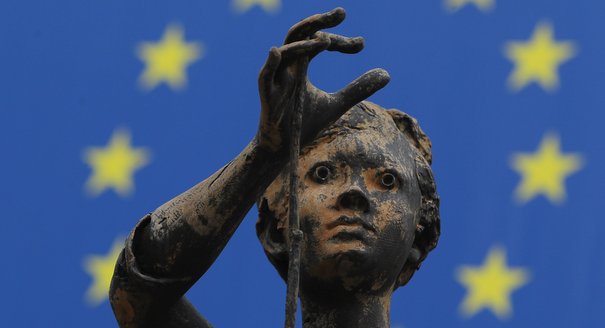So, it’s political, and that is why it’s so difficult to find a solution for this eternal crisis. In a grand sovereignty bargain, states need to agree to shift institutions that perform state functions to a level that transcends their own, formerly exclusive, domain. True, the entire European integration process relies on such bargains, but with budgetary rights affected, the required next step would collide with the mental foundation of all politics in Europe (and perhaps the world): the hugely successful marriage of the nation and the state.
Alongside the separation of church and state, enlightenment, and humanistic individualism, the nation-state is arguably Europe's most important, and most successful historical innovation. Merging the identity-creating powers of the nation—originally a tribal term—with the awesome powers of rules-based technocratic administration—pioneered originally be the ancient Greeks and, more decisively, the Romans—created the most successful political entity in history. To this day, no other entity offers a more politically meaningful sense of belonging to individuals than the nation-state. It is indeed so successful that today the nation and the state have, for the most part, become the same thing. They are synonymous.
However, from the outset, the European integration process has been an exercise in separating the nation and the state. This was a mostly harmless thing as long as core issues of sovereignty were not touched. But with the current crisis, decision time has come in the integration process. The survival not only of integration itself, but of Europe's ability to create and maintain wealth, stability, and freedom at the current, unprecedented level, will depend on whether Europeans are able to think state without nation.
This is not nearly as threatening as it may sound. Creating state-like political and administrative structures above the nation-state does not at all mean that the identity-creating powers of the nation must wane and disappear. People can remain proud Englishmen or Frenchmen or Spaniards or Danes while making joint decisions on some of the political and technical questions that shape their common destiny. The size of global political challenges, the necessities of international competition, and Europe’s relative loss of importance in the greater scheme of things would make this necessary in any case. European integration is not the utopian dream of emotionally detached post-modernists. It is the ultimate exercise of realism in a world where maintaining the status quo requires unprecedented levels of change.
In the late middle ages and the early modern period, the tribes of Europe united—not without considerable pain—to form nation-states, which offered them the best chances of survival in their new political and economic environment. Today's nations must unite to form a state-like entity that transcends national boundaries for the same reasons. The big difference today is that forming such a union can be a lot less painful than the formation of nation-states 400 years ago. Unlike the nation state, the European Union does not require anyone to give up existing allegiances and identities. These can remain in place while something additional is created on top. Integration merely adds another layer to already multi-layered modern identities.
Europeans are good at these things. Identities work differently everywhere across the continent. The UK has—at least—three nations within one state. France's strong national identity reconciles an anarchic political culture with a strong statist tradition. In Italy, national identity is weak, except in football. Germany, the "belated nation", feels stronger about its state than about its nation. Belgium is two states in one nation (or is it two nations in one state?). In Europe, no authoritative, universally applicable model for the relationship between the nation and the state exists. The nation-state itself, in all its perceived strictness, allows for flexibility and variation. Why should a continent so used to unity in diversity not be able to invent yet another innovative model capable of accommodating political and emotional needs?
In purely technical terms, creating political institutions above the nation-state level is a fairly simple thing to do. The tricky part will be to create the emotional buy-in required to make them work. Among other things, the nation-state is the perfect merger of three elusive but existentially important "soft" concepts: identity, sovereignty, and legitimacy. Thinking and practicing them together is the genius of the nation state. Today, legitimacy and sovereignty need to be carefully adjusted while keeping existing identities intact. This is the real challenge of the current crisis. If Europe wants to survive politically and retain its current level of civilization, much will depend on whether, 400 years after one of its greatest inventions, it can once more re-define the terms under which people live together best in a gravely changed world.









